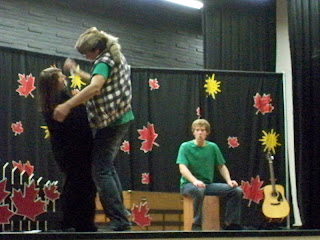Today I walk to school and spring is springing, as is Angie, my walking buddy and colleague from the Elementary School. Later, I am remembering my ordeal, long ago, at the Bessborough, where I bombed a presentation. I have never felt quite so vulnerable. Reminds me of Brene Brown's Gifts of Imperfection. I remember Brown's advice, "Don't shrink. Don't puff up. Stand your sacred ground." Oh did I shrink and for a few months, but later, after a great phone call with my grandparents, I learned to step into my vulnerability and "stand my sacred ground." I post pages 52 to 56 of my 2006 Thesis: Blue Eyes Remembering Toward Anti Racist Pedegogy.
A Long Anesthetization
The next day of the conference I have to present a different session about the flashcard system I’ve invented for my Storefront students. My dad, a retired teacher, comes with me.
I’m introduced. I sing a song I wrote. I advocate passionately that we teach students, starting from where they are. I facilitate a cooperative learning activity using flashcards. My dad beams like a beacon from his group. One lady writes, “Hooray for flashcards” on her evaluation.
My mind is still in the long, blue room.
Later that week, I meet up with my colleagues at the Prince Albert Grand Council Conference. I tell my research colleagues about my ordeal. “Some people can be so prejudiced” my colleague, who is Dene, says.
I am scheduled to present four sessions. I am on autopilot for the rest of the week. I replay over and over the tones, glances, whispers, comments, arm movements, feet leaving. My chest aches like the weeks after my first boyfriend broke up with me.
I fly home to the reserve, but my nightmare continues. I’ve been accepted to present three all-day workshops at Effective Strategies13th Annual National Aboriginal Conference in Winnipeg
My research colleague who is taking her Masters Degree in Bi-lingual, Bi-cultural education from the University of Arizona
I prepare a slide show to introduce myself in Winnipeg
Is this the way we “professionals”
Deal with challenges
to our identity, authority, worth?
Should we be
Asking ourselves
These questions
More often
Than not?
-- Michael
As the snow melts I begin to feel some hope. Maybe I can do this. I pour myself into preparation for Winnipeg
Cure for cancer
This is caught up in self worth.
I think that sometimes
We define our self worth
By the things
That are probably not things
That we should hang our hopes on.
It goes toward respectability.
-- Michael
I add to my thirty-frame slide show and script a forty-page hand out. I meditate on Buffy Sainte Marie’s words about guilt and bitterness. I videotape some of my students at Storefront. I practice my guitar. I make new flashcards. I plan a culture-shock game. I burn overheads. I write a “philosophy bingo” icebreaker.
It’s April and I have two stuffed binders, one for each session. One week until the conference and the questions and haunting have returned.
I phone my elderly grandparents who were both teachers. I ask, “Why do I do this? Am I doing it for the recognition? If I am, then it’s not worth it. This is just too much work. Why do I keep pushing myself out there and making myself vulnerable?”
I hear the silence echo over 700 miles of telephone lines and anticipate Grandpa’s response: you’re doing it for the attention; your ego is too big; you’re compensating for feelings of insecurity.
Grandpa says, “You keep pushing yourself because you want to serve people.”
Grandma adds, “You want to add to the common good.”
The tight lines at my eyes relax a bit. A knot in my chest and a lump in my throat make me feel alive. Yes, I do want to serve people. I do want to make the world a better place.
Why?
Does this really answer
Your question of why
You do this?
Is there more to the
Answer?
-- Michael
In Winnipeg
The Winnipeg
Why is this the right attitude
and not the other questioning attitude?
-- Michael
Upon Re-reading Question Mark in Abstract Abstract
Bonus words: at, man, tea, serve.
Pre-fix-is words: re, wo, Eng, on, ex.
Suf-fix words: es, ite, lish, ence
Name words: cher, mem
Onomatopoeia words: wh, lish, ber, peri
-what-are-(re)-emerging-them-es-as-I-a-wh-ite-wo-man-Eng-lish,tea-cher-(re)-mem-ber-my-on-re-serve-ex-peri-ence-
Serve them tea on cher-lish man.
Emerging ex-man my I wo-es.
Keynote speaker says the sooner we figure out that life is about service
the happier we’ll be.
Serve Them.
Quick Conclusion to a Long Anesthetization
Although evaluations in Winnipeg
I think it is in part
About you;
How could it not be?
-- Michael



















































